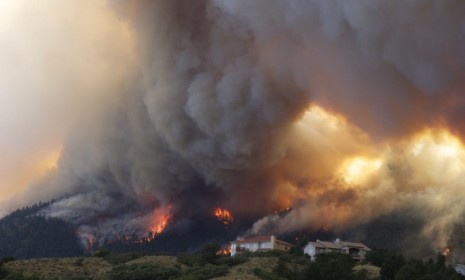The Colorado wildfires: Is this what global warming looks like?
Scientists have long predicted that rising temperatures could lead to extreme weather conditions, including wildfires, droughts, freak storms, and more

A free daily email with the biggest news stories of the day – and the best features from TheWeek.com
You are now subscribed
Your newsletter sign-up was successful
"Horrendous wildfires. Oppressive heat waves. Devastating droughts. Flooding from giant deluges. And a powerful freak wind storm called a derecho," says Seth Borenstein for The Associated Press. These are the kinds of extreme weather conditions that have assailed swathes of the country in recent weeks, from the raging wildfires in Colorado to a devastating East Coast thunderstorm — the derecho — that killed 20 people and left millions without power. The deadly weather is hardly a surprise to scientists who have long predicted that climate change would lead to precisely these types of disruptions, even if they can't definitively link the man-made phenomenon to individual weather events. "This is what global warming looks like," Jonathan Overpeck, a scientist at the University of Arizona, tells Borenstein. Can we really blame the recent flurry of extreme weather on global warming?
Yes. Welcome to the age of extreme weather: "Still don't believe in climate change?" says Eugene Robinson at The Washington Post. "Then you're either deep in denial or delirious from the heat." It's no longer possible to "dismiss climate change as a figment of scientists' imagination, or even a crypto-socialist one-worldish plot to take away our God-given SUVs." In addition to the menacing weather, data shows that "nine of the warmest 10 years on record have occurred since 2000." Climate change deniers insist on blaming the extreme heat on the whims of Mother Nature, but "there comes a point where anomalies can start looking like a trend."
The Week
Escape your echo chamber. Get the facts behind the news, plus analysis from multiple perspectives.

Sign up for The Week's Free Newsletters
From our morning news briefing to a weekly Good News Newsletter, get the best of The Week delivered directly to your inbox.
From our morning news briefing to a weekly Good News Newsletter, get the best of The Week delivered directly to your inbox.
But Republicans are still in denial: "Please don't sweat" the fact that there were 2,132 record-high temperatures in different places across the country in June, says Bill McKibben at The Daily Beast. "Remember, climate change is a hoax," at least according to leading members of the Republican Party, including its presumptive nominee for president, Mitt Romney. But "for a hoax, it's got excellent production values," as if someone had turned on a giant special-effects machine to dump torrents of rain on Florida, turn the Midwest into a Dust Bowl, and crank up the heat in Colorado. "And then came the fire stunts!" This is truly an "epic disaster flick," and "we're not even close to the finale."
"Bill McKibben on the global warming hoax"
Actually, it's probably a combination of factors: Weather is comprised of so many variables that it's impossible to establish a direct causality between climate change and individual events, Michael Oppenheimer, a scientist at Princeton, tells Britain's The Guardian. The best way to think about how global warming affects weather is the "loading the dice" analogy, which says that rising temperatures will increase the chances of a weather phenomenon becoming extreme and more widespread. "The events are individual data points in a broader pattern, akin to pixels on a computer screen. You can't say much from any one pixel, but a picture emerges when you step back and look at the pattern."
"Is it now possible to blame extreme weather on global warming?"
A free daily email with the biggest news stories of the day – and the best features from TheWeek.com
Still, it's time to take action: "It's not just about the polar bears anymore," says The Los Angeles Times in an editorial. Recent weather events and new data have brought "the reality of climate change from the polar ice caps to our backyard." At this point, the greatest element of uncertainty no longer comes from what climate change will do to the weather, but "what humans will do — or not do — to combat global warming." The latest developments call for policies to reduce carbon emissions and plan for environmental disasters in the future.